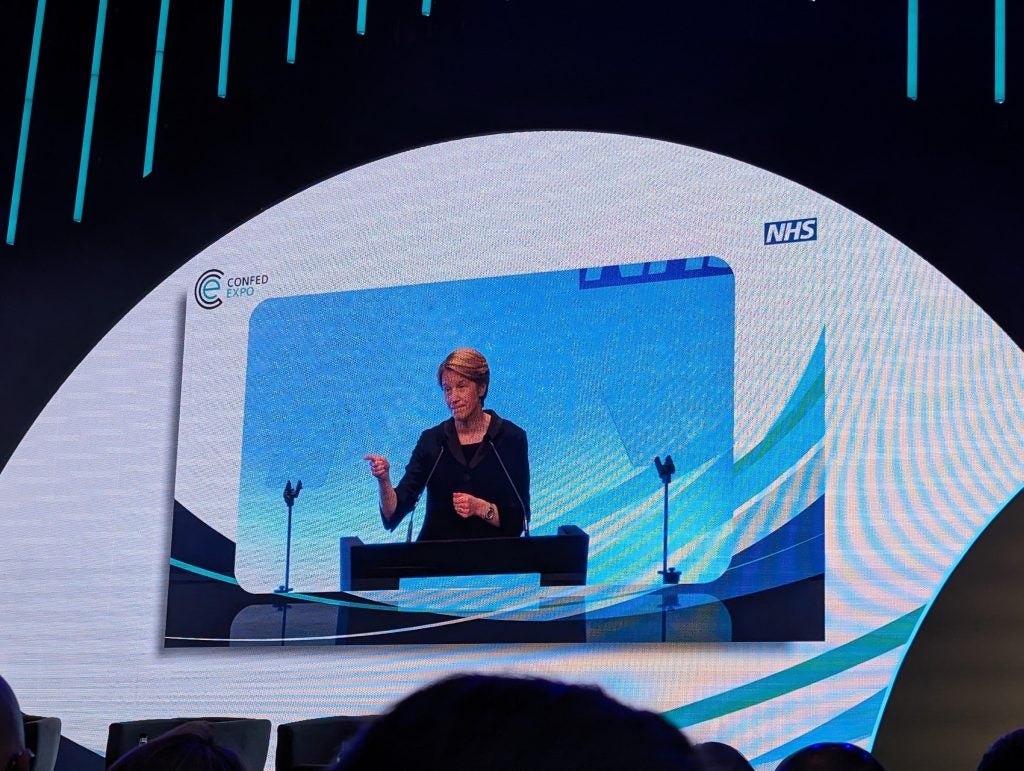The chief executive of the National Health Service (NHS) England spoke about her desire to ‘bolster management and leadership’ after the Conservative party announced that it would redirect £1bn of funding currently used for NHS management.
Amanda Pritchard was centre stage at the NHS Confed Expo, held at the Manchester Central Convention Centre on 12 and 13 June, as she spoke about how she hopes to support the NHS of tomorrow.
The conference falls just days after the Conservative party announced that should it win the general election on July 4, it would look to redirect £1bn of funding designated to NHS management to increase GP appointments, build 100 new GP surgeries and modernise another 150.
NHS needs well-supported managers
The first point of the three-point plan outlined by Pritchard was to provide better training to those in NHS management positions. Pritchard explained how many of these positions are filled with staff who had progressed through the ranks in their departments after showing competency but said that many of these staff do not receive training for the management role and instead need to ‘learn on the job’.
“It really shouldn't be controversial to say that the NHS needs well-trained, well-supported managers at every level. That's what makes well-performing teams. It's fundamental to getting back to our pre-pandemic productivity growth driving the best possible use of taxpayer’s investment,” Pritchard explained.
“If we want a well-run NHS, we must support those who run it. If we want leaders to be accountable, which we do, we must give them the tools they need to do their jobs well. We will shortly begin developing a new multidisciplinary NHS management and leadership framework,” Pritchard added.
Ambition to be the fastest-improving health system in the world
As she outlined her second point of the plan, Pritchard spoke about how the NHS needs to give people the tools and the information they need to improve but that this improvement must be ‘everybody’s business’.
The NHS will be establishing improvement collaboratives and networks to allow staff to share practical data and evidence of working productively and efficiently.
“We need to have the right information at the right time and use it in the right way. Whether that's up-to-the-minute operational data from within the organisation, or benchmarking and best practice from outside - that's crucial,” Pritchard said.
Making it easier than ever to innovate
For part three of the plan, Pritchard spoke about the need to utilise more technology and innovation to support the future of the NHS, including an increased use of AI and automation.
“Some say that the NHS is stuck in an analogue past and sure some bits still are. But we are already building the foundations that make better care possible. The planning we're doing now to deploy extra funding next year will help us put rocket boosters under that progress, getting the basic building blocks right so we can take full advantage of the data and AI revolution,” Pritchard said.
The NHS chief also spoke about the use of AI, including in hyperacute stroke units to speed up care and how to generate discharge summaries.
The NHS recently launched the cancer vaccine launch pad, a trial investigating personalised cancer vaccines, as well as the expansion of trials of screening newborn babies for rare diseases to allow the NHS to intervene earlier with treatment.
The NHS has also rolled out the federated data platform (FDP) with 43 trusts that have already implemented the software. The FDP brings together operational data which has previously been stored in separate systems. This data can include the number of beds in a hospital, the size of waiting lists for elective care services, or the availability of medical supplies.
Pritchard also shared the NHS’s ambition to make London the first city in the world to offer a digital-first urgent and emergency care service.
However, she was quick to add how this three-point plan is not an exhaustive list of improvements needed in the NHS, citing the need to work on public health and prevention, boosting capacity and quality in social care, and other areas of the service which she admitted are lagging.
"It's important to recognise where we need to do better for patients but it is also important that we don't collude with defeatism. Yes, the post-Covid-19 NHS is damaged, but it is not destroyed, it is struggling, but it is still doing incredible things every day," Pritchard said.
The NHS boss also spoke about how the service has been working on tackling gambling addiction and childhood obesity, setting up hubs across the country.
Pritchard also acknowledged previous failings of the NHS, including the infected blood scandal and the story of Martha Mills, a child who died in hospital from septic shock over an August bank holiday weekend due to lack of proper care; concerns around the safety and experience in maternity services; and tales of staff subjected to unacceptable behaviour; violence; and sexual assault at work, highlighting how the NHS needs to do more to ensure that these kinds of scandals will not happen again.









